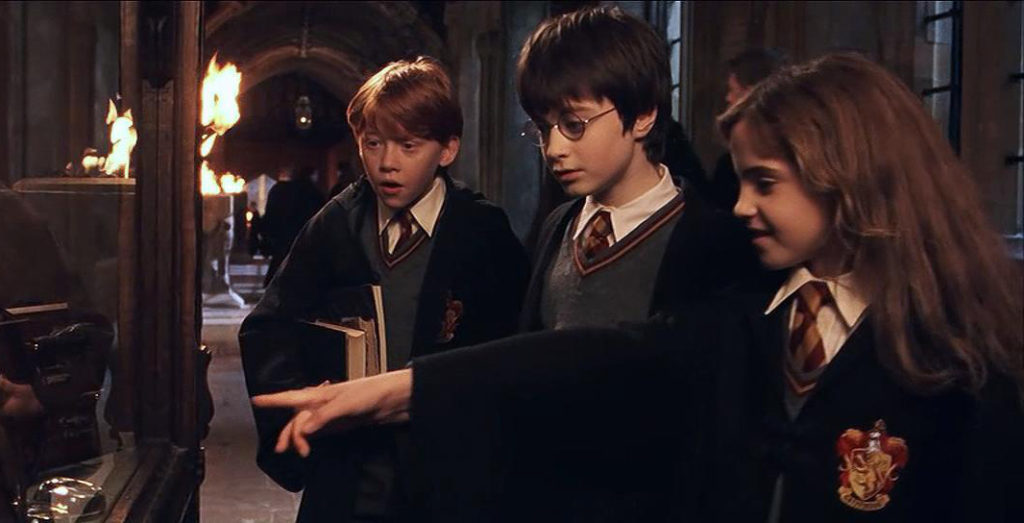If the Harry Potter universe could be described in one word, ‘secretive’ comes to mind. The brainchild of J.K. Rowling, the entire storyline is so intricately crafted, answers are revealed bit by bit; and, like Harry, you uncover them when you are meant to. Harry Potter remains a pop culture phenomenon; even those unfamiliar with the story may have encountered numerous Harry Potter references in other films and television programs such as “Love Actually” and “The Simpsons,” attended a (very real) quidditch match, or visited the theme park The Wizarding World of Harry Potter.
Harry Potter is the boy who lived, orphaned as an infant as a result of an attack in his family home. How and why he survived is one of many subplots explored throughout this epic tale. Harry’s signature lightning bolt scar serves as a visible reminder of that day; partnered with the emotional burdens he carries, one can’t help but feel sympathy for the title character the moment we meet him. Yet, it’s clear that what he’s endured so far in his short life has done nothing to dampen his spirit.
When we are introduced to Harry (Daniel Radcliffe) in this first chapter, “Harry Potter and the Sorcerer’s Stone,” we witness a bit of his backstory as an orphan living in the care of his aunt and uncle who are frankly just not very likable people. Treated as the ‘red-headed stepchild,’ he is forced to sleep in a cupboard under a staircase and function as the household servant. As his wizard powers begin to emerge, the mistreatment from the closest remaining family he has only grows.
As Harry approaches his eleventh birthday, he is invited to attend the Hogwarts School of Witchcraft and Wizardry. A myriad of fantasy epics have come before this and since, and what all share in common is the vivid world-building. In this, ‘non-magical folk’ are known as muggles, and individuals with magical abilities, or wizards and witches, are first summoned to Hogwarts around the age of eleven to ‘train up.’
Harry encounters both the bookish Hermione Granger (Emma Watson), and the friendly Ron Weasley (Rupert Grint) while en route to Hogwarts. The playful chemistry between these actors is so charming from the beginning you can’t help but smile. These three relatively unknown actors at the time were well chosen for the roles. Little is revealed in this first film in terms how travel in and out of the wizarding world works, save for a visit to ‘Platform 9 3/4’ (like Harry and the station worker he’s asked for directions, anyone else would shake their head at that one too) and a peak at one method of entering ‘Diagon Alley.’

The characters are incredibly memorable. Of course, the set design, sound, and lighting choices are stellar; the Quidditch match between the Slytherin and Gryffindor houses is a study in contrast as the violent match plays out in peaceful skies, but it is the characters that drive this film. Over the course of the film, the young students are forced to grow up quickly, the innocence of childhood no more as they are forced to tackle life and death situations. The supporting cast includes the late Alan Rickman, Maggie Smith, Richard Harris, and Robbie Coltrane. At this stage, the supporting cast outshines the main characters for no other reason than the main characters have yet to mature and come into their own.
Clocking in at 152 minutes, the PG film may be overlong for some viewers but it is at the same time necessary to tell the story. Over the course of this first film, this incredibly dark and foreboding world starts to reveal itself. There are frightening moments starting midway through the film which might be inappropriate for younger viewers; the wizarding world is embroiled in a magical war, simmering in this first chapter, but viewers can sense what is coming.
Viewers unfamiliar with the books or subsequent films may be left a bit unsatisfied, as few answers are provided to many questions in this first chapter. It is both maddening and brilliant at the same time, and it inspires the viewer to dive right in to the next chapter only to again find few answers and encounter even more secrets. This is why the franchise is so successful: it sucks the viewer in so effortlessly and leaves us wanting more.